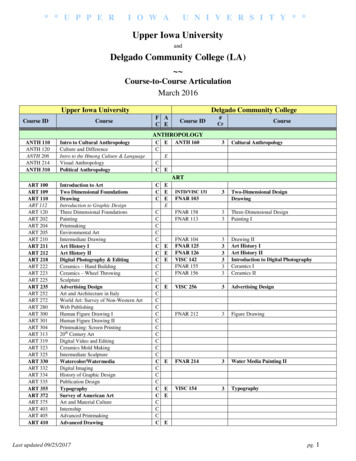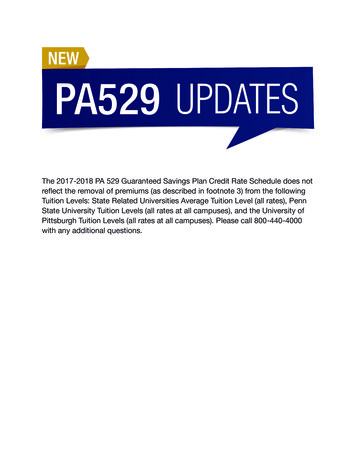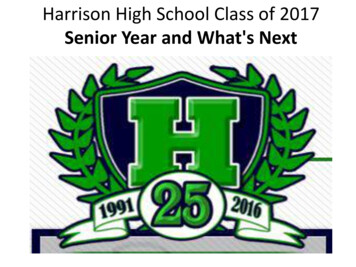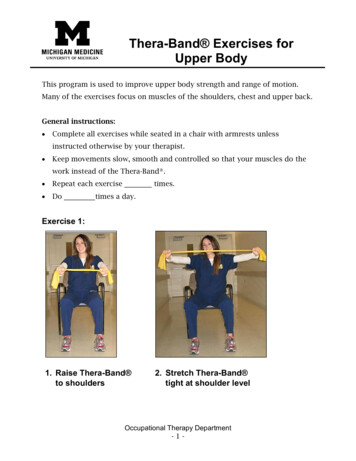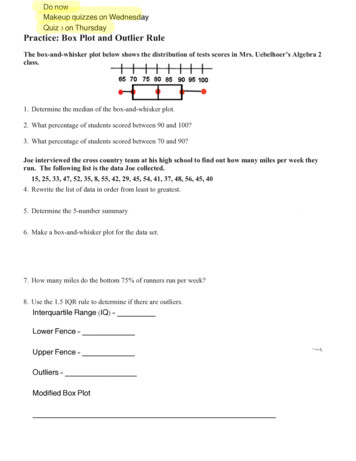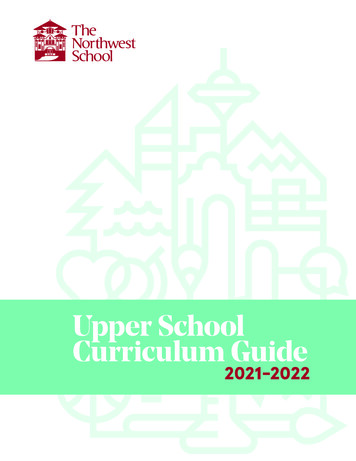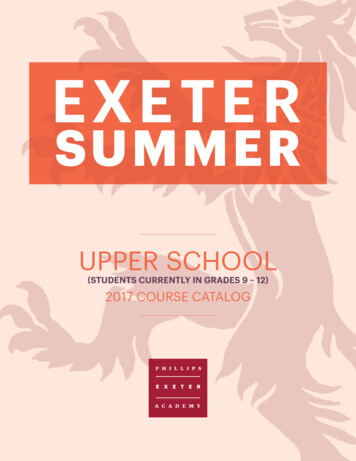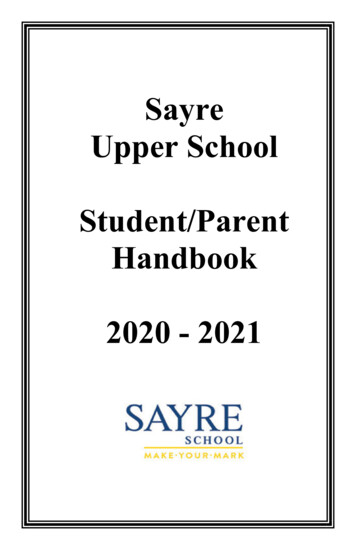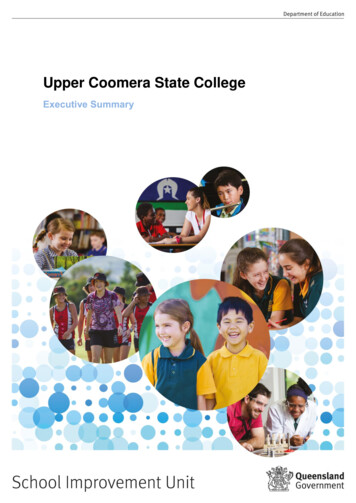
Transcription
Upper Coomera State College
Acknowledgment of CountryThe Department of Education acknowledges the Traditional Owners of the lands from acrossQueensland. We pay our respects to the Elders past, present and emerging, for they holdthe memories, the traditions, the culture and hopes of Aboriginal and Torres Strait Islanderpeoples across the state.A better understanding and respect for Aboriginal and Torres Strait Islander culturesdevelops an enriched appreciation of Australia’s cultural heritage and can lead toreconciliation. This is essential to the maturity of Australia as a nation and fundamental tothe development of an Australian identity.2
ContentsAcknowledgment of Country . 21. Introduction . 41.1 Review team . 41.2 School context . 51.3 Contributing stakeholders . 61.4 Supporting documentary evidence. 62. Executive summary . 72.1 Key findings . 72.2 Key improvement strategies . 93
1. IntroductionThis report is a product of a review carried out by a review team from the SchoolImprovement Unit (SIU) at Upper Coomera State College from 10 to 13 February 2020.The report presents an evaluation of the college’s performance against the nine domains ofthe National School Improvement Tool. It also recommends improvement strategies for thecollege to implement in consultation with its regional office and school community.The report’s executive summary outlines key findings from the review and key improvementstrategies that prioritise future directions for improvement.Schools will publish the executive summary on the school website within two weeks ofreceiving the report.The principal will meet with their Assistant Regional Director (ARD) to discuss the reviewfindings and improvement strategies.For more information regarding the SIU and reviews for Queensland state schools pleasevisit the SIU website.1.1 Review teamWayne TroyahnInternal reviewer, SIU (review chair)Lee GoossensInternal reviewerGayle ColemanPeer reviewerLaurie ShepherdPeer reviewerJo DiesselExternal reviewer4
1.2 School context5Location:Reserve Road, Upper CoomeraEducation region:South East RegionYear levels:Prep to Year 12Enrolment:2009Indigenous enrolmentpercentage:6.2 per centStudents with disability:Education AdjustmentProgram (EAP)percentage:8 per centNationally ConsistentCollection of Data(NCCD) percentage:16 per centIndex of Community SocioEducational Advantage(ICSEA) value:963Year executive principalappointed:2019Significant partnerschools:Highland Reserve State School, Coomera State School,Coomera Springs State School, Helensvale State HighSchool, Pacific Pines State High School, PimpamaSecondary College, St Stephen’s College (P-12), AssisiCatholic College (P-12), Coomera Anglican College (P-12),Foxwell State Secondary CollegeSignificant communitypartnerships:Gold Coast Academy of Sport (GCAS), Aurora TrainingInstitute, Busy At Work, Westfield HelensvaleSignificant schoolprograms:STEM (Science, Technology, Engineering andMathematics) Academy, Sports Academy, Creative ArtsAcademy
1.3 Contributing stakeholdersThe following stakeholders contributed to the review:School community:Executive principal, two heads of school, six deputy principals, two heads of inclusion,Business Manager (BM), pedagogy coach, Positive Behaviour for Learning (PBL) coach, 12Heads of Department (HOD), three guidance officers, four Support Teachers Literacy andNumeracy (STLaN), seven secondary deans, 61 teachers, inclusion team, P-12 Writingteam, P-12 reading team, P-12 PBL team, Active Travel team, six Professional LearningTeams (PLT), Local Consultative Committee (LCC) team, School Based Police Officer(SBPO), two corporate services staff, four primary office staff, four secondary office staff,eight teacher aides, ten college support officers, six primary student leaders, six secondarystudent leaders, 25 primary students, 28 secondary students, Parents and Citizens’Association (P&C) president, 21 parents and two tuckshop conveners.Community and business groups: Gold Coast Sport Academy, Aurora Training Institute, Busy at Work, WestfieldHelensvale, representative of secondary schools cluster and principal of HighlandReserve State School.Government and departmental representatives: Division 1 Councillor and Deputy Mayor City of Gold Coast, State Member forTheodore and ARD.1.4 Supporting documentary evidenceAnnual Implementation Plan 2019Strategic Plan 2018 - 2021Investing for Success 2019School Data Profile (Semester 1 2019)OneSchoolReading frameworkProfessional Learning Priorities 2019Curriculum planning documentsSchool improvement targetsHigh Performance Culture 2019School pedagogical frameworkHeadline Indicators (October 2019 release)School Opinion SurveyWriting frameworkSchool budget overview 2019–2020being developedResponsible Behaviour Plan for Students2019School based curriculum, assessmentand reporting frameworkReport card and NAPLAN update Semester 12019School newsletters and website6
2. Executive summary2.1 Key findingsA calm and measured learning environment exists at the college.Staff members, parents and students express satisfaction with the college and the level ofeducational instruction students are receiving. The tone and culture of the college arearticulated as key priority areas for development and advancement. Parents and staffmembers express improvement in the tone and culture of the college in recent times.The college is investing in significant human and physical resources to enhancestudent learning.The college applies its human and financial resources in an innovative and targeted mannerto meet student learning needs. There is an appreciation from staff, students and parentsregarding the high quality of college facilities. A sense of pride in the college is apparent andthis is reflected in the way the buildings, classrooms, grounds and gardens are presented.The college leadership team is focused on, and is committed to, improving learningoutcomes for all students.A current vision for the college is outlined in the ‘High Performance Culture 2019’ documentand is stated as ‘Innovative, Committed, Inspired’ as the base of activities. Staff membersindicate a desire to work closely with the college leaders to reinvigorate a clear P-12 collegevision and to enact the vision over an extended period.College leaders communicate the belief that every student is capable of successfullearning.Community leaders, parents, students and staff comment that the work undertakenregarding high expectations in relation to uniform and behaviour is contributing to thecollege’s positive reputation in the community. The work of the college’s Response toIntervention (RTI) and Positive Behaviour for Learning (PBL) teams demonstrates acommitment to improving student achievement and engagement. Building on the success ofimproving the tone and culture of the college is viewed as a base for a focus on improvedstudent learning.The college’s leadership team and teaching staff members express a commitment toimplementing the Australian Curriculum (AC).The leadership team is cognisant of the need to collaboratively develop a whole-collegecurriculum framework that aligns with the Department of Education’s (DoE) curriculumassessment and reporting framework. A whole of college curriculum plan that detailsexpectations for teaching, learning and assessment is yet to be fully developed.7
Staff members are committed to the belief that every student can engage withschooling and learn successfully.The leadership team reports that in 2019 initial planning was commenced by the two headsof inclusion in developing a college inclusion framework. The framework developmentenables a mechanism for a formalised strategic review process that can build an agreedcollege vision for a model of inclusive practices for the full range of students with diverselearning needs.The executive principal and the leadership team place a high priority on attracting,retaining and developing an expert teaching team as a prerequisite to delivering highquality learning outcomes.College leaders conduct regular walkthroughs to observe Explicit Instruction (EI) lessonstructure in practice. They provide feedback to teachers regarding their practice using theclassroom walkthrough feedback postcard. Teachers indicate they are supportive of thefeedback on their practice. Procedures are yet to be developed to support teachers toobserve the practice of others through formalised coaching processes or other classroombased learning.The college executive supports all staff members in becoming systematic with dataanalysis processes.College leaders and staff members share a common belief that the discussion and analysisof suitable student data is essential in supporting student learning improvements. Thewidespread use of data is apparent across the college.The executive principal and leadership team recognise that improving qualityteaching is key to improved student learning outcomes.The college has reviewed the school’s pedagogical framework to strengthen staff memberunderstanding and consistent implementation of agreed high-yield strategies. The leadershipteam is committed to continuous improvement in college priorities including EI and theteaching of reading and writing.The school has well-established partnerships with local businesses, communitysupport agencies, sporting organisations, schools and universities.Community partners speak positively of their interactions with the college leadership teamand staff. They report strong, productive relationships with the college with an openness andwillingness of the college to work in partnership with business. They report that a growingpositive image and reputation of the college are developing amongst community members.8
2.2 Key improvement strategiesEnhance support for the future direction of the college by intentionally collaborating with thecollege community to review and enact a vision in terms of P-12 advantage.Intentionally align high expectations of student engagement, wellbeing and achievement witha commitment to constructive language regarding a belief in student success and identity.Collaboratively develop a quality assured whole of college curriculum plan aligned to the AC.Collaboratively develop a college inclusion framework aligned to departmental best practicethat builds a clear vision, identifies consistent and transparent systems and processes, andprioritises actions and accountabilities.Develop a culture of continuous improvement that includes classroom-based learning,mentoring and coaching arrangements.9
Improvement Unit (SIU) at Upper Coomera State College from 10 to 13 February 2020. The report presents an evaluation of the college's performance against the nine domains of the National School Improvement Tool. It also recommends improvement strategies for the college to implement in consultation with its regional office and school community.

